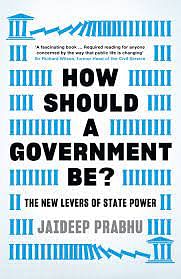Since 1978, when its ruling Communist Party opened up to the world, China has enjoyed a remarkable renaissance. The country’s achievements not only make it globally important, but they also require us to be nuanced about its complexities and contra- dictions. In the space of four decades, the country has gone from being a backwater to the second largest economy in the world. Much of this growth has been achieved by a novel form of state-controlled capitalism, whereby the government has encouraged foreign and domestic firms (some of which are state owned) to use the market mechanism to deliver innovation.
At the same time as revitalising private enterprise, the Chinese government has also pushed for change in the public sector. As Yijia Jing and Stephen Osborne describe in Public Service Innovation in China (2017), starting around 2003, the Chinese government began promoting a ‘service-oriented government’ that extends and builds on its core mission of law enforcement. At the central and local levels, public sector institutions have become engaged in service delivery – in improving health, education and citizen services – and citizen satisfaction has become an increasingly important indicator of public performance. Modern techniques have been introduced to help with this: surveys to evaluate performance, and microblogs and weChat, a social media app, to disseminate information.
Most of these innovations, however, pale in comparison with the Social Credit System, a national programme designed to assess the economic and social reputation of citizens and businesses. Under the system, all Chinese citizens will be given a credit rating based on their economic and social behaviour. The rating will combine western-style credit scores with more expansive and potentially intrusive measures. These could include data from online payment providers or scores produced by neighbourhoods for good behaviour. The rating will have consequences for citizens. Those with high scores will receive perks such as favourable bank loans and discounts on heating bills, while those with low scores could be barred from buying plane or high-speed-train tickets.
Launched in 2014, the system focuses on ‘honesty in government affairs’, ‘commercial integrity’, ‘societal integrity’ and ‘judicial credibility’. The government sees the system as a way to regulate the economy and as a tool of governance to steer the behaviour of citizens. According to the State Council’s founding document, the scheme should ‘allow the trustworthy to roam everywhere under heaven while making it hard for the discredited to take a single step’. As of 2020, the plan to have an initial phase of the system in place nationwide seems to have largely been successful.
Also read: Jailed dissenters, disappearing journalists — How China is controlling the Covid story
How it plays out can be seen in Rongcheng, one of three dozen cities across China where the system was first introduced. Rongcheng’s City Hall, like the city itself, has a futuristic feel: it is a glass and steel concoction that looks like a spaceship. In a bid to ease bureaucracy, the hall serves as a one-stop shop for citizens seeking permits and licences. To save them from driving from one office to another, residents can speak to officials across departments at their desks in gleaming open-plan spaces. At one of these spaces, they can also pick up their social credit score.
Operated by the deputy director of the Rongcheng Social Credit management office and seven other employees, the system works as follows: 1,000 points are assigned to each of the city’s 740,000 adult residents at the outset. If you get a traffic ticket, you lose 5 points. If, on the other hand, you earn a city-level award for a ‘heroic act’, run a good business, or help your family in difficult circumstances, you get 30 points. A department-level award gets you 5 points. You can also earn points by volunteering in city programmes or giving to charity. Anything that affects your score must be backed up by official documents.
Depending on your score, you get a rating from A+++ to D. (Some offences can hurt your rating badly. Drunk driving could cause your rating to drop to a C.) An A+++ rating makes you eligible to rent public bikes without a deposit, receive a $50 heating discount in winter, and get bank loans on good terms. Companies, too, are subject to the system. They can gain points for paying taxes on time but lose them for selling substandard or unsanitary products. Businesses with higher scores benefit from more favourable loan conditions and pass through fewer hoops in winning public tenders.
The system has already been embroiled in much controversy. Across the country, Chinese courts had ‘banned would-be travellers from buying flights 17.5 million times by the end of 2018’ and ‘citizens placed on blacklists for social credit offences were prevented from buying train tickets 5.5 million times’. Others have been banned from admitting their children to certain schools, renting hotel rooms, using credit cards and even finding employment. Citizens have also been punished for their online behaviour – for spending too much time playing games or for their shopping habits – and a whole host of personal acts that have no impact on the wider community. Human Rights Watch calls the programme ‘chilling’ and filled with arbitrary abuses. Others see it as a frightening mass surveillance and disciplinary machine.
Also read: Don’t get fooled by Xi’s media blitz. China’s ‘zero poverty’ hides more than it reveals
Complicating matters, there is no single system. Currently, each local government has its own system with its own variations. There are also private versions such as Sesame Credit, set up by Ant Financial, a payments firm that was spun out of Alibaba, China’s Amazon. In some cases, there are agreements between cities and companies such as Alibaba and Tencent that enable data exchanges which go into citizen assessments. Mareike Ohlberg, a research associate at the Mercator Institute for China Studies, finds this linking of data from private systems to government rankings troubling. Currently, she says, there is a great deal of data moving around with no protection, and no transparency about the algorithms used to produce a score or ranking.
That said, the system isn’t entirely unique to China; there are parallels in the West. In the UK, for instance, credit rating systems combine data from a citizen’s credit score with phone usage and rent payments to filter job applications or determine access to social services. And companies like Experian track and supply data on how timely we are with debt repayments for use by banks and mortgage lenders. In Germany, data from a universal credit rating system, Schufa, is combined with geo-location and health records to determine access to credit and health insurance. Small businesses in the West are not immune either: those who sell on digital platforms like eBay or Amazon are subject to social-style scores based on shipping times, and Uber drivers and Airbnb renters are routinely rated by customers with consequences for their earnings. But what makes the Chinese system unique is that it extends this idea to all aspects of citizens’ lives, including civic behaviour such as jaywalking, paying bills, playing music in public spaces, and so on. Ohlberg does not believe that the use, and abuse, of aggregated data for the analysis of behaviour is itself a Chinese phenomenon. But she does think that if the Chinese system comes together as envisioned, it would be ‘both unique and part of a global trend’.
According to the Chinese government, the Social Credit System is about building trust. This claim is not implausible.
 This excerpt from ‘How Should A Government Be?‘ by Jaideep Prabhu has been published with permission from Profile Books.
This excerpt from ‘How Should A Government Be?‘ by Jaideep Prabhu has been published with permission from Profile Books.



